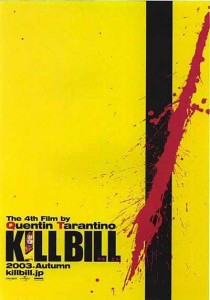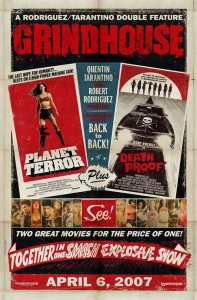#5. Kill Bill vol. 1 & 2 (2003 & 04) / Grindhouse (2007) / Inglourious Basterds (2009)
(director: Quentin Tarantino; starring (Kill Bill) Uma Thurman, David Carradine, Michael Madsen and Daryl Hannah; (Grindhouse) Kurt Russel; (Inglourious Basterds) Brad Pitt, Mélanie Laurent and Christoph Waltz)
Quentin Tarantino might seem to be an easy director to dismiss, seemingly unable to overcome perpetual juvenilism, his movies are each an exercise extravagant cinematic fanboy pastiche. But honestly, in a weird way each of the titles mentioned above are kind of, sort of, just a little bit masterpieces. First of all it helps to be possibly the only working director left in the nation able to be granted whatever scale of budget he wants for his next project with no strings attached (he basically built the Weinstein  Company with the massive successes that were Pulp Fiction and Reservoir Dogs and it appears that the Weinsteins will continue to return the favor until the day they go bankrupt). This leaves Tarantino with unlimited creative powers to make some of the most daring cinematic experiments mainstream audiences will ever see. A few notable marks of a Tarantino film include incessant homages to everything from 1970’s blaxploitation movies to Italian spaghetti westerns along with 1940’s screwball comedies and the French New Wave… frequently within the same scene, and yet somehow he never becomes derivative, the quality of his work is always fresh and original. Then there’s the way he structures his stories, which are never predictably linear. Starting with the Kill Bill movies, which by themselves were split into two distinct halves, the first and endless martial-arts action gorefest following a nameless protagonist, the second suddenly an introspective character study, both jumping back and forth with multiple flashbacks (which can take up to a half hour)
Company with the massive successes that were Pulp Fiction and Reservoir Dogs and it appears that the Weinsteins will continue to return the favor until the day they go bankrupt). This leaves Tarantino with unlimited creative powers to make some of the most daring cinematic experiments mainstream audiences will ever see. A few notable marks of a Tarantino film include incessant homages to everything from 1970’s blaxploitation movies to Italian spaghetti westerns along with 1940’s screwball comedies and the French New Wave… frequently within the same scene, and yet somehow he never becomes derivative, the quality of his work is always fresh and original. Then there’s the way he structures his stories, which are never predictably linear. Starting with the Kill Bill movies, which by themselves were split into two distinct halves, the first and endless martial-arts action gorefest following a nameless protagonist, the second suddenly an introspective character study, both jumping back and forth with multiple flashbacks (which can take up to a half hour) and employing multitudes of stylistic influences. Most recently was Inglourious Basterds, which is built around seven or so gigantic scenes mostly set within one location, each with its own story arc and style, the result of this structure is not completely unlike watching a great stage play. Then there’s his middle effort, Death Proof, which by itself is notable for the two completely separate stories that mirror each other and share the same character, but each with a different outcome. That’s not even to talk of the structural choice of billing it as the second half of a double feature along with partner Robert Rodriguez, complete with fake trailers and intermissions. Some people dislike Death Proof a great deal, and while it might be my least favorite of his movies by itself, I still like it quite a bit. However, within the context of the movie Grindhouse I think it’s absolutely perfect. Scaling back from the visual excesses and cornball mayhem of Rodriguez’s Planet Terror (which were not entirely authentic to real Grindhouse movies; they didn’t have access to CG every other scene), Tarantino’s replicates actual conventions of genre by filling it with mostly low-budget talking scenes centered around one or two expensive action scenes. The magic is that by the second half of his film
and employing multitudes of stylistic influences. Most recently was Inglourious Basterds, which is built around seven or so gigantic scenes mostly set within one location, each with its own story arc and style, the result of this structure is not completely unlike watching a great stage play. Then there’s his middle effort, Death Proof, which by itself is notable for the two completely separate stories that mirror each other and share the same character, but each with a different outcome. That’s not even to talk of the structural choice of billing it as the second half of a double feature along with partner Robert Rodriguez, complete with fake trailers and intermissions. Some people dislike Death Proof a great deal, and while it might be my least favorite of his movies by itself, I still like it quite a bit. However, within the context of the movie Grindhouse I think it’s absolutely perfect. Scaling back from the visual excesses and cornball mayhem of Rodriguez’s Planet Terror (which were not entirely authentic to real Grindhouse movies; they didn’t have access to CG every other scene), Tarantino’s replicates actual conventions of genre by filling it with mostly low-budget talking scenes centered around one or two expensive action scenes. The magic is that by the second half of his film (when the audience is starting to fatigue from the whole ‘grindhouse’ experience as the runtime approaches three hours) he dials way back on the gimmicks that kept most of the film going until that point and just focuses on creating a quality movie… not unlike many new directors working under the label of ‘grindhouse’ in the 1970’s (George Romero and even Martin Scorsese come to mind). Another reason for the general dislike of Death Proof is a third hallmark of any Tarantino movie: the dialogue. I’ll maybe admit to part of that criticism of Death Proof while not conceding entirely; Kill Bill and then especially Inglourious Basterds are near flawless in this regard. Just looks at what he achieved in Basterds: it’s notorious for being one of the most shocking and un-PC movies of the decade and yet 90% of the film is just dialogue, intricately balanced between three different languages (four if you count the, ahem, ‘Italian’ heard in one of the final scenes). Similar can be said for volume 2 of the Kill Bill series, minus the multilingual gymnastics. The curious thing about Quentin Tarantino is that while his movies may inspire a series of stylistic imitators that most people really wish would disappear from the face of cinema, the actual works themselves are always quite extraordinary.
(when the audience is starting to fatigue from the whole ‘grindhouse’ experience as the runtime approaches three hours) he dials way back on the gimmicks that kept most of the film going until that point and just focuses on creating a quality movie… not unlike many new directors working under the label of ‘grindhouse’ in the 1970’s (George Romero and even Martin Scorsese come to mind). Another reason for the general dislike of Death Proof is a third hallmark of any Tarantino movie: the dialogue. I’ll maybe admit to part of that criticism of Death Proof while not conceding entirely; Kill Bill and then especially Inglourious Basterds are near flawless in this regard. Just looks at what he achieved in Basterds: it’s notorious for being one of the most shocking and un-PC movies of the decade and yet 90% of the film is just dialogue, intricately balanced between three different languages (four if you count the, ahem, ‘Italian’ heard in one of the final scenes). Similar can be said for volume 2 of the Kill Bill series, minus the multilingual gymnastics. The curious thing about Quentin Tarantino is that while his movies may inspire a series of stylistic imitators that most people really wish would disappear from the face of cinema, the actual works themselves are always quite extraordinary.
Previous / The 21 Best Films of the 21st Century / Next
Comments